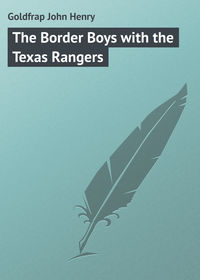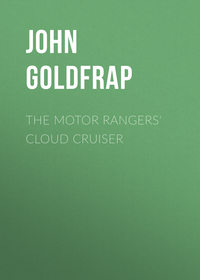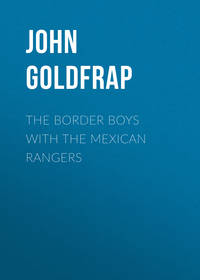 полная версия
полная версияThe Bungalow Boys Along the Yukon
"Pshaw! You would hardly expect to find visitors in correct regalia for calling in this section of the country," he said.
"Come down to that," agreed Tom, chiming in with his uncle's laughter, "I guess that we are pretty hard-looking cases ourselves."
Before they had time to comment on this remark, which was unmistakably a true one, the sound of footsteps coming down the loose, stony trail could be plainly heard. A few minutes later two men came in sight. Both were typical products of the region.
One was tall, strapping and sun-browned, six foot two in his stockings. His round, good-natured face was topped with a thatch of corn-yellow hair, which, with his light blue eyes and fresh complexion, showed his Norse origin.
The other wayfarer was smaller and more compact, but as he bent under his heavy pack they could see the tense muscles bulge and play under his coarse blue shirt. He was tanned almost to a mahogany hue and, no less than his companion, bore the stamp of a battler in the lonely places. A certain quiet air of watchfulness, of self-reliance and ruggedness sufficiently displayed this quality.
The two men introduced themselves. The fair-haired one was Olaf Gundersen, for many years a dweller in the Yukon region. He had packed, trapped, hunted and prospected for many seasons in the wildest parts of Alaska. With his companion, Lafe Cummings, a wiry Iowan, he was making a trail down the Yukon to be used later on when the two established a pack train. From the proceeds of this venture they hoped to reap a golden harvest, which their rough, adventurous lives had so far failed to yield them.
They were bid a hearty welcome and before long the entire party, re-enforced by the two newcomers, were seated about the fire devouring their supper in a way that bade fair to call for a replenishment of the larder in the near future.
"Ah-h-h-h! dase bane good grub," sighed Olaf, as he finished up a hunk of cheese after disposing of two heaping saucerfuls of canned peaches, the latter opened as an especial compliment to the company.
"You're dead right there, Olaf," agreed Lafe in a high, nasal tone. "You folks done us white and no mistake."
They sat around the fire late that evening, and the boys' elders explained the object of their presence in the region as freely as they thought advisable. Lafe and his partner were equally open in discussing their affairs, and the boys listened with rapt attention to the budget of tales the two hardy pioneers had to tell of the Yukon and its pleasures and perils. As they talked, the rushing voice of the river and the deep sighing of the wind in the pines made a fitting accompaniment to their Odyssey of the far north.
Lafe had just finished a picturesque tale of life in Dawson City in the early days, when eggs were a dollar each and flour worth literally its weight in gold, when, from the forest behind them, came a shrill, unearthly cry. It was like the shriek of a human creature in mortal agony and it cut the silence like a knife.
They all looked around, startled for an instant, and then Mr. Dacre exclaimed:
"A wild-cat!"
"That's what it is. One of them pesky varmints, sure enough," declared Lafe. "I mind me of a time in Nevady, when – "
But they were none of them listening to Lafe just then. Their eyes were centered on Olaf.
An extraordinary change had come over the big, blonde Norwegian. He glanced about him nervously, almost timorously. It was odd to see the effect that the ululation of the wild cat crying out in the woods had had upon the strapping frontiersman. His light eyes held, for an instant, all the fear of a frightened child. Then the cry died out and with its passing, the fear faded from his face.
By common consent they looked at Lafe, as if seeking an explanation for the phenomenon. Olaf glanced uneasily about as if he was half afraid of being ridiculed for his momentary exhibition of alarm.
"One fears one thing, one is dead mortal scared of another," volunteered Lafe at length. "I knowed an old lady at home that wouldn't go nigh a cat. 'Nuther feller I hev in mind was as bold as a lion in everything but one, an' that was spiders. Yes'ir, let a spider come anigh Spence Higgins and he'd come purty near hollering out like a school gal that spied one of the critters on her best pink muslin."
"Yes, I suppose that we all have our pet dislikes," said Mr. Dacre.
"Wa'al, Olaf, he's got a heap more reason an' title to his dislike than most of us, I reckon," said Lafe. "I'll bet a cookie right now that you thought that thar critter was a mounting lion fer a minute, na'ow, didn't yer, Olaf?"
The big Norseman smiled his slow smile.
"He bane sound powerful lake it, Lafe," he said at length, "an' das a soun' you know I don't bane lake. No, sir, he skoll make me bane planty scared all right, I tale you."
"You had some adventure with a mountain lion one time?" asked Mr. Chillingworth, scenting a story.
"Aye. I skoll bet you may lafe, I bane have bad time with mountain lion one tame long ago," said Olaf slowly. "I never forgate him, I bate you, no not so long as I skoll live."
"Tell 'em about it," urged Lafe, "go on. Then they'll see why you've no reason to like the critters, though there's none round hereabouts that ever I heard tell of."
Olaf regarded the group about him with unblinking eyes and his slow, good-natured smile.
"You lake I bane tale you why I no lake mountain lion?" he asked.
"Yes, please, by all means," urged Mr. Dacre, who knew that it could have been no common adventure that had branded this big-limbed giant with a dread of a creature which ordinarily is glad enough to give human beings a wide berth.
"Then I bane tale you why Oaf Gundersen give mountain lion the inside of the trail whenever as be I skoll meet him again," said the Norwegian.
"It all happened a long time ago," he began, and in telling his story we shall not try to reproduce his odd, broken idioms, nor his inimitable style, "a long time ago when the boys here must have been little fellows. It was back in Californy where the creatures were as thick as blackberries and gave lots of trouble to the settlers and the miners. I was working a small mine and trying to run a small mountain ranch at the same time. My living I eked out by hunting and trapping when I got a chance.
"One day while I was out hunting, a big mountain lion and his mate came down on the ranch and killed the only horse I had. I hunted the male for a week and then I found him and shot him down. But the account was not yet even. I determined to kill his mate, too.
"I tracked her for days but could never get close enough to her for a shot. The creature appeared to have an uncanny sense of my purpose of revenge. She always evaded me with what appeared to be almost supernatural skill. Time after time I thought that I had her at my mercy, only to have her escape my rifle-fire unharmed.
"After some time devoted to this fruitless quest of vengeance, I began to see the killing of this puma as a fixed purpose. Nothing else seemed to matter much so long as I could kill the beast that had so often evaded me.
"I used to start out early every day and return home only late at night from the hunt, and always I was baffled. The she-puma still lived in spite of my efforts. If she had been human I would have said that she laughed at me, for sometimes at night I could hear her screaming in the forest like a big wild-cat, as if in defiance of me.
"At such times I would grit my teeth as I lay in my bunk and say to myself. 'All right, my lady. It's a long lane that has no turning, and I'll never give up till I have killed you.'
"But the next day she would avoid me again, sometimes by not more than a hair's breadth; but it was enough. She carried her hide whole and I was still unrevenged for the death of my horse.
"One day I followed her trail to a part of the mountains where fallen trees, underbrush and jagged stones made the traveling hard. All at once, after some half hour of scrambling forward, I found myself facing a cave, a black, narrow opening in a cliff of grayish stone that towered high above the forest.
"I knew as if by instinct that I had found the mountain lion's lair. But was she inside? That was the question. If she was, I determined to lie there till she came forth, even if it took days, and then despatch her without mercy.
"With this object in view I cast myself on my stomach in the midst of a tangle of underbrush, and with my rifle all ready for instant use I began my vigil.
"I lay there for quite some time," said Olaf, "and then, all at once, I began to hear sounds that made me prick my ears up. From inside the cave came whining little growls and mews almost like the crying of kittens. Of course I knew almost instantly what caused the noise. The puma had young ones. They were what I heard.
"'Aha!' thought I, 'so much the better. Now I know I have you, my lady. When you come back to your cubs, I shall kill you and my revenge will be complete.'
"The thought gave me much satisfaction and I lay there listening feverishly for the slightest sound of the returning mother. But after a while something happened that gave my thoughts a different trend. Out of the cave mouth there came tumbling two fuzzy, fussy little mountain lion cubs. They looked like yellow balls of down. They sat there blinking in the sun for a while and then began playing just as kittens do. It was a pretty sight, but I had other thoughts to occupy me just then. An idea had suddenly come to me.
"Why not take the cubs and raise them? I would be able to sell them to some menagerie or zoo for a good sum when they grew older, and I would thus be repaid for the loss of my horse. The more I thought it over, the better my plan appeared to me. I resolved to put it into instant execution."
CHAPTER XXIII
OLAF'S GREAT LESSON
"Another thing that urged me to take the cubs," continued Olaf, "was the fact that I was certain that if I kept them captive in my hut the mother would sooner or later put in an appearance seeking them, and then I could kill her with ease. So, as the two cubs rolled about kitten-like, I wriggled through the brush toward them, and then with a sudden leap I pounced on them and seized them both by the scruff of the neck. They spat and growled vindictively, but I had hold of them in such a way that they could not hurt me. It didn't take me long to tie them together with a bit of twine, and then shouldering my rifle and carrying the mewing, spitting cubs, I set out for home.
"The trail was a rough one to follow and I had a lot of difficulty. I had not gone more than a hundred yards before, quite close behind me, I heard a horrible yell. In an instant I dropped the cubs and jerked my rifle up to my shoulder. I knew what that yell meant. It was the mother lion after the man who had robbed her of her cubs.
"I dropped to my knee to steady my aim, and as her tawny, lithe body came into view, I fired. It was a shot that I wouldn't have missed once in a hundred times under ordinary circumstances. But this was the hundredth time.
"As my weapon was discharged, the lioness emitted a great roar, gave a whisk of her tail and dashed off into the forest. I knew that I had not harmed her. It was then that I began to think that the creature bore a charmed life. It certainly appeared so.
"I was the crack shot of that part of the country and yet I had gone wide of a target that a ten-year-old boy could not well have missed. But as I picked up the cubs and resumed my journey, I thought to myself, with grim satisfaction, that it would not be long before I had another chance at the beast, and that next time I promised myself that my bullet would find its mark.
"Well, it wasn't long before what I expected and hoped for came true. I was out in the back of my shack splitting wood two days later, when through the light green of the trees that grew close up, I thought I saw the flash of a swiftly-moving, tawny body.
"I chuckled to myself. 'So you have come at last, eh? That is good. Now you and I will try conclusions together.'
"Such was the thought that ran through my mind as I made all haste into the hut for my rifle. As the light-colored mass moved again among the trees, I leveled my weapon and fired. But again I missed!
"There was a swift dash, more like the passage of a streak of light than the moving of a living thing, and then I knew that the puma had fooled me once more. But I also knew that she would come back. The mother-love that lives in all animals would bring her. I was to pay dearly for playing upon this noble instinct. I have never tampered with it since. A creature with young is sacred to me. But I had not learned my lesson then, and I planned to use the puma's motherly instinct to trap her to her destruction.
"That evening she was back. I heard her crying her soft, mother cry among the trees. From inside the cabin, in a sort of rough cage I had contrived for them, the cubs answered her with little sharp barking cries.
"But strong as were the ties that bound her to the cubs, the mother mountain lion came no closer. She was not visible to me. I crouched, rifle in hand, waiting for one chance at her; but it didn't come. She kept far up the mountain side, from time to time giving her cry. It was like the cry of that wild-cat we heard to-night. It was a sound that I have come to dread. Sometimes in dreams I hear it and then I waken and cry out. Lafe can tell you.
"I brought the cub's cage outside the hut. I thought that maybe that would bring her within range of my rifle. But the animal seemed to know I was laying a pitfall for her, for she did not approach any closer; but all that night her cries shook the forest.
"I shouted at her. My desire for revenge had got the upper hand completely of me now. When the puma shrieked and howled, I shrieked and howled, too.
"'I shall kill you yet,' I promised her, 'your hour is close at hand. Olaf will have his revenge for his horse. You will see.'
"Toward morning the cries came closer.
"'Now is my time,' I thought.
"I took my rifle and sallied out of the hut. It was bright moonlight. Once more the cries came from a clump of woods up to my left. I swung round. My heart gave a bound of delight. Out of the deep shadow of the woods I saw two burning points of light gleaming. I knew what they were. The puma's eyes!
"All I had to do was to fire between them. For me, that ought to have been an easy task. But quick as I was in raising my rifle, the puma was quicker of movement than I. In a flash the points of light had vanished, and when next I heard her cries they came from some distance off.
"Utterly disgusted, baffled and angry, I went back to my bunk. I lay long awake revolving all sorts of schemes to catch the puma napping, and I was still planning when I fell asleep. That night my dreams were all of the working out of my revenge. I guess I wasn't far from going crazy. Dwelling all the time on one thought and living alone, had worked powerfully on my mind. I felt that if I didn't kill that mountain lion she'd kill me, and how near she came to doing it, I'm going to tell you in a minute.
"For one mortal week I tried every way I could think of to get a shot at that lion. But it was all of no use. If the animal could have read my mind, she couldn't have kept out of the way more cleverly than she did.
"But all the time she was near at hand. The cubs, whom I fed regularly with venison and small game, used to answer her night and day. I lost sleep and flesh, but still I was no closer to attaining my object.
"I tried dozens of ways of getting my chance to shoot the animal down. Failing in all of them, I set poisoned bait around the house. But it was never touched. With the same uncanny instinct that had taught her how to keep out of my reach, the puma avoided the poisoned meat. Steel traps were a joke to her, I guess, for conceal them cleverly as I might, she never went near them.
"And all the time I grew madder and madder. I had hunted and trapped for a good many years and this was the first animal that had ever escaped me once I set out to get it. I began to get nervous. When I was out hunting, for I had to go pretty frequently to get food for the young pumas, the slightest unexpected sound would make me jump out of my skin.
"'Olaf, you've got to end this thing,' I told myself.
"And then later on I said to myself again:
"'Olaf, you must end the puma or the puma will end you, my friend.' And so the days went by. A dozen times a day and as many at night I would think I was at last to put an end to the almost unbearable situation, and every time that puma fooled me. But all the time she was about the hut. Always within earshot of the cubs.
"One day, for security, I shut them in an inner room. I was afraid that during one of my absences the mother mountain lion might break in and effect a rescue. It was about two days after I had made this arrangement, that the thing happened that has ever since made me pale when I hear the shrill cry of a mountain lion or any sound resembling it.
"It was in the early morning. I was sitting outside my shack cleaning my rifle. I was happy and whistling quite gaily. Suddenly I looked round for some rags to finish up my job. There were none there and leaning my rifle against a stump, I went into the hut to get some.
"I had just about got inside when I heard a roar, and then a great body came hurtling past me into the hut. The puma had been watching me. By this time, so often had I fired at her, she knew that my strength lay in my rifle. The instant that she saw me lay it down, she knew her chance had come. Like a flash she was into the hut after her cubs.
"And there was I, weaponless, powerless, and face to face with a mother puma mad to regain possession of her little ones.
"I had one second in which to think and act simultaneously. My bunk was built high up, luckily, and with one bound, so active did my terror make me, I was in it and secure for an instant. The puma crouched, lashed her tail and with bared claws glared at me with terrible hatred in her green eyes.
"I could feel the cold sweat break out upon me. I could almost sense the last struggle when she should have sprung upon me in the bunk. But at that instant the cubs beyond the door set up their cries anew. That saved me for the time being. With a mighty bound the puma flung herself against the door. Again and again she flung herself at it like a battering ram.
"But it was a stout door and it resisted all her attacks till at last, panting and breathless, she lay down on the floor of the hut to rest. I dared not move for fear of attracting her attention. I was in a horrible trap. Noon came and passed and still she lay there. I was almost mad with thirst, but stronger than my thirst was my fear of that great cat crouching there with her eyes fixed on the door beyond which lay her cubs.
"The door fastened with a steel catch. If only I could reach that catch, release it and open the door there was a possibility that my ordeal would be at an end. Having regained her cubs, there was a chance, a mighty slim one, but still a chance, that the lioness would take them and go.
"The time dragged along on leaden feet. The sun grew lower. A ray of the declining day struck in through the one window the hut boasted and struck the steel catch that confined the cubs.
"How long it was after this that my nerve went all to bits, I don't know. But go it did. I gave a loud yell and then, careless of what might happen, but determined to end the tension at all hazards, I reached out with one foot and kicked up the steel catch.
"I was quick but not quick enough. As the door swung open, the lioness leaped for my leg, but the next instant she saw in the room beyond her two cubs. In her joy at beholding them again everything else was forgotten by her. With her sharp, strong claws she tore the box that confined them to bits, and then, after licking them all over, she picked them up as a cat does her kittens and – strode out of the door.
"I never saw her again; but I shall always remember her by this."
The woodsman drew up one leg of his loose trousers and showed a long, livid scar.
"That bane why I skoll never hear the cry of the puma or a cry that bane lake him without feeling the big fear," he concluded.
Olaf's story had taken some time in its narration, but it had held them spell bound. They all agreed that he had passed through an ordeal well calculated to make him dread the creatures, one of which had held him a prisoner for so many terrible hours.
They turned in late and when they awakened, Olaf and Lafe had taken their leave without disturbing them. They had left a scribbled note of thanks, however, with their best wishes for good luck.
"I shall never forget Olaf Gundersen," declared Tom, a sentiment which the rest echoed.
CHAPTER XXIV
ON THE PORCUPINE RIVER
We must now pass over an interval of several weeks. During this period our readers are to imagine the numerous rapids and perils of the Upper Yukon conquered and the permanent camp of the silver fox hunters established upon the swift Porcupine River, not far above its junction with the Yukon and amidst a country wilder than any into which the Bungalow Boys had yet penetrated.
The work of setting out the peculiarly constructed traps in which the silver and black foxes were to be trapped had occupied much time, and some exciting adventures with bears and wolves had accompanied the work. When completed, the "trap-line" extended for more than twenty-five miles from the camp, which was pitched on the bank of the river to which the Yukon Rover was tied.
Did space permit we should like to tell in detail, and may at some future time, the numerous exciting episodes that marked those weeks of our young friends' lives. But we must now hasten on to an event which was to try their resources as they had rarely been tested before, and which was peculiarly characteristic of the life in that wild region "north of fifty-three" which they were exploring.
It is first necessary to explain that the work of overseeing the trap-line was attended to every week, the work being divided into "shifts," one of the party, or more, being left to guard the camp during the absence of the others. At the particular time we are now dealing with Mr. Dacre was disabled with a slight fever, and Sandy, also, was a "little under the weather" from the same cause. So that it devolved upon Tom and Jack to assume the task of going over the trap-line, a duty which had to be performed, while Mr. Chillingworth remained behind with the invalids.
And right here it is proper to explain that although the traps had been set and baited, the trappers did not expect any results till later in the season when the "big cold" set in. Nevertheless, in order to guard against the possibility of vicious or unprincipled trappers or "dog Indians" interfering with them, a rigid patrol was necessary to insure the well being of the trap-line. The actual trapping was destined to come later when the wastes of forest to the north were frozen and the creatures of the wild came toward the river in search of food.
Well used to roughing it as the boys were, they carried little more with them on these expeditions than flour, "erbwurst," – a sort of concentrated soup, not very palatable, but nourishing, – teas, salt and sugar. Their rifles, blankets and canteens completed their loads, with ammunition, of course, sufficient to enable them to "live on the country."
The trap-line led back into a wild range of mountains known as the Frying Pan Range, though just why that name had been given to the section is beyond the present chronicler to explain.
On the particular morning with which we are dealing, we find Tom and Jack almost at the end of the trap-line. Not much to their surprise, their investigation of the fifty or more traps scattered through this territory had not resulted in their discovering any silver foxes ensnared. Other wild creatures, though, had been entrapped, but they were not bothering with these. In every instance, if they were not maimed, the creatures were set loose, with one exception. That was the ugly "glutton" or wolverine, a notorious robber of trappers' and miners' camps, and a savage, truculent animal. When such creatures were found, they were despatched without mercy.









